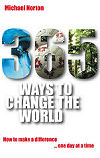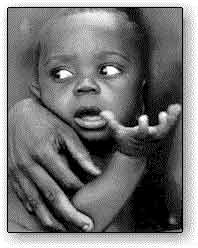|
| |
Challenges
Money Talks
What needs to get done
How to get it done
What decision makers can do
What communicators can do
How to influence the medical profession
What everybody can do
Support: What Decision Makers,
Communicators,
the Medical Profession, and You Can Do
|

|
Children are dying from dehydration ... know the
facts.
see:="../diarrhoea/index.html" target="_top">diarrhoea,
dehydration,="../ors/index.html" target="_top">ors,="../facts/index.html" target="_top">facts,
and links They don't have to die ... you can make a
difference.
Decide how to participate. How you can and wish to support ...
your skills, time, money, passion,
ideas, resources, energy, ...
see: challenges,="../ors/index.html">ors,="../facts/index.html" target="_top">facts,="../resources/index.html" target="_top">resources,
links and
this page
Do what you said you would do.
|
 |
365
Ways to Change the World
How to make a difference... one day at a time
The ultimate answer for anyone who has ever asked “how can I make
a difference?”, this ingenious handbook suggests one action for
every day of the year – some are intriguing, many are unusual, a
few involve fundraising, almost all can be planned or done from
your home or computer, most will be fun, all are achievable,
including:
• Support trade justice: buy three footballs
• Avoid landfills by freecycling
• Create a lifeline for remote African villages with wind-up radio
• Sow the seeds of a green revolution with guerrilla gardening
• Organise a fundraising event: speed dating for safer childbirth
• Get out of debt: join the Church of Stop Shopping
• Fight child slavery with fairtrade chocolate
• Influence the world media: become a blogger
Learn how you can make a difference in the area of diarrhoea
prevention
 pdf
155 kb. pdf
155 kb.
Details of the book and how to order
 pdf
100 kb. pdf
100 kb. |
|
What needs to get done
 |
Only 38 per cent of diarrhoeal dehydration
sufferers are treated with Oral Rehydration Therapy ORT. The="../facts/world-summit.htm">1990 World Summit for Children
set major health and development goals for children to be achieved by the year 2000,
including
- a 50 per cent reduction in deaths due to diarrhoea in children under five
and - a 25 per cent reduction in the diarrhoea incidence rate.
A priority is to increase the proportion of patients receiving ORT and continued
feeding to 80 per cent by the end of 1995.
|
|
How to get it done
- ORT should be made "a family habit" through
communication, social mobilization and information;
- health providers should prescribe ORS and promote ORT for
every case of diarrhoea, advise parents and give correct treatment for all types of
diarrhoea;
- all health facilities - private and public - should be
strengthened with skilled personnel and adequate drugs;
- preventive measures should be taken.
UNICEF, the World Health Organization, the Rockefeller
Foundation, the United States Agency for International Development, Junior Chamber
International, The Hunger Project and the US Centers for Disease Control and Prevention
have mobilized behind these goals and placed them at the top of their agendas. The Boy
Scouts have pledged their participation. The coalition of these forces promises a good
beginning. But they cannot do it alone.
Here are some activities that could be carried out by individuals, non-governmental and
volunteer organizations to help promote Oral Rehydration Therapy.
|
|
What decision makers can do:
- Disseminate information on the problem, and the solution, to ensure
sustained political commitment and adequate resource allocation;
- Support the creation of a social movement to make ORT a family habit;
- Create an alliance of governmental and non-governmental bodies to teach
correct ORT procedures to families;
- Ensure that families are taught the importance of the three Fs -- fluids,
feeding and further help -- when children are having diarrhoeal attacks;
- Ensure that there is one ORS dispensing depot within walking distance for
every 1,000 families;
- Increase the output of ORS packets from 500 million to 1 billion
globally;
- Speak out in favour of ORT;
- Ask education ministers to mobilize teachers to talk about ORT in the
classroom.
|
|
What communicators
can do:
- point out that one of this century's most important medical breakthroughs
has been largely underreported and underappreciated;
- report that most diarrhoea medications are useless or harmful, that only
in a small number of cases are antibiotics or antimoebics the correct treatment, and that,
other than ORS, medicine should be used only if prescribed by a doctor or nurse;
- broadcast television reports on the worldwide ORS programme to save more
lives than did penicillin;
- assign reporters to investigate the obstacles to ORT use in their
countries;
- use the media to promote ORT as the best scientific option for the
prevention and treatment of diarrhoeal dehydration.
|
|
How to influence the medical profession:
- distribute leaflets reiterating that I.V. treatment is eight times as
expensive as ORT;
- promote the fact recognized by modern doctors that ORT is the most
scientific and cost-effective option;
- rally around other voices from the medical profession that endorse and
reaffirm ORT.
There are doctors, nurses and pharmacists who fail to advise parents about
ORT. THIS IS NOT RIGHT. All doctors, nurses and pharmacists must recommend ORS
for every case of diarrhoea. When they fail to do so, it is because they have
not kept up with the research about ORT or are wary of new treatments that
were not taught when they were in medical school. In some countries, medical
school started teaching about ORT only a few years ago.
|
|
What everybody can do:
- Convene meetings of community and government leaders to discuss specific
issues related to children.
- Organize youth forums to discuss dehydration and the Convention on the
Rights of the Child and call for its implementation.
- Persuade sports stars to promote ORT through the mass media, youth and
sports organizations, and stadium management to display messages about the dehydration
during games.
- Arrange encounters of leading artists, public personalities, writers and
intellectuals to discuss the situation of children in the country and in the world.
- Organize exhibitions of photographs and art work by professional
photographers and artists including children on child-related subjects.
- Organize peaceful marches to alert the public to such issues as
dehydration, survival and child development.
- Urge radio stations to broadcast talk shows for youth to ask questions
concerning dehydration and problems affecting children in their communities.
- Seek the involvement of parliamentarians in promoting ORT through
round-table discussions, town meeting and meet-the-people sessions.
- Enlist the support of NGOs and civic and religious leaders through
encounters/seminars on the well-being of children and of the importance of ORT, and ask
that all places of worship dedicate services, with appropriate liturgy, music, prayers and
sermons.
- Encourage airlines to play the ORT promotional video before the in-flight
movie.
- Encourage transit authorities to display ORT posters on buses or subway
trains, and leading merchants to display the poster in store windows.
- Encourage school superintendents to include an ORT course.
- Encourage regularly scheduled concerts and other performances to be
dedicated to children, and to include messages about ORT in their printed programmes and
displays.
- Ask radio and TV stations, and publications of all kinds, to run public
services announcements and display ads about ORT and the needs of children
- Sell ORT T-shirts, buttons, posters, etc., to promote awareness and raise
funds for local children's service and advocacy efforts.
- Hold an exhibition on the Rights of the Child and invite prominent
community leader, the mass media and school children.
- Organize a road run, big walk or bike tour to raise awareness on
children's issues.
- Raise funds to adopt a project in a developing country benefiting
children.
- Persuade local and national libraries to highlight books on children.
- Organize essay-writing competitions among children and adults.
- Convince newspapers to carry supplements on children's issues;
especially about dehydration.
|
updated: 23 August, 2019
|